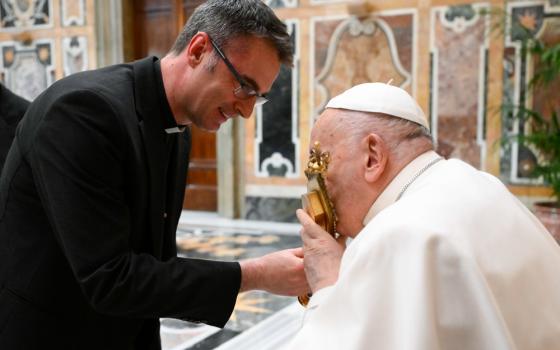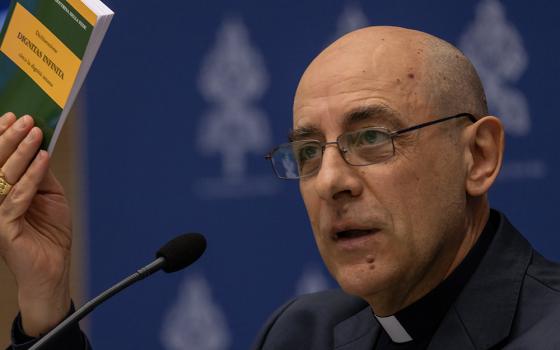
(Newscom/DanitaDelimont.com/Russell Gordon)
Back in 1956, Erich Fromm, a psychologist and social philosopher, wrote The Art of Loving. His thesis was clear and direct: Five characteristics mark the life of a lover -- active concern, respect, responsibility, knowledge and generosity. No romanticism here; love is a gritty, demanding reality yet one that leads to joy and peace.
Loving is foundational to a healthy life. To be loved and to love makes us human and happy.
But what about laughing? Are we not risible beings capable of roaring, giggling, snickering, guffawing, howling, chortling, cackling, yes, to die laughing? Our ability to laugh and to cry cuts across all cultures and centuries.
I've been looking for a book titled The Art of Risibility, but it must be out of print, for my search has been futile. Thus I must conjecture on what its contents might be and offer a few markings competing with Fromm's five components of love. In the end, perhaps loving and laughing are first cousins.
Incongruous! For a starter, we have Aesop: " 'What dust we raise,' said the fly upon the chariot wheel." The hubris of a fly does no one harm, but when humans think that they make the world turn, or walk around with a sense of immortality or that they are the center of the universe, the sages smile.
The philosopher Josef Pieper offers another example of incongruity: " 'My garden,' the rich man said; his gardener smiled." The novelist George Eliot writes: "He was like a cock, who thought the sun had risen to hear him crow."
The fly, the rich man, and the rooster live with delusions and we laugh until we realize we suffer the same malady. The claim that we are owners of our time and talent and treasure makes God smile (and cry?).
Unexpected! The element of surprise has the power to bring about that explosive vocal sound we call laughter. Listen to Jesuit Fr. Anthony de Mello: "Don't try to teach a pig to sing; it wastes your time and it irritates the pig." Then there is psychologist and author Mary Pipher's "Don't pole-vault over horse turds." Throw in novelist Wallace Stegner: "Trust everybody, but cut the cards."
We don't expect pigs to get irritated or small turds to demand a mighty leap or that trust is encouraged right along with suspicion. So we laugh and wonder what we waste our time on or how we sometime lose perspective in dealing with problems or whether or not we dare have confidence in our playing partners. Laughter gives us pause to see how we deal with life.
Ridiculous! Novelist Anthony Trollope asserts: "It's all very well preaching sermons to good people, but nothing ever was got by preaching to people who ain't good." If so, preaching is ludicrous and farcical. English Prime Minister Winston Churchill had the audacity to say: "We are all worms, but I do believe that I am a glow-worm." American author Kurt Vonnegut put running for political office in perspective: "Only clearly disturbed people ran for class president." And, yes, New York Mayor Fiorello La Guardia: "Ticker tape ain't spaghetti."
Poignant! At first glance, humor seems miles away from anything that would cause painful feelings, that pushes us to the edge of grief. Yet, maybe humor has its own strange poignancy.
Does it not hurt to hear that "Even the first-grader has a kindergarten kid to push around" (actor John Shea)? We hate to admit that bullying can start at age 7 and then continue through life. Or as one ages, to identify with novelist C.S. Lewis who said, "I am now unofficially an extinct volcano."
Time and time again, we witness our mentors and models beginning to lose their intellectual acumen. Those necessary losses, though "humorous," are also so sad. Or even more tragically, "God, in France, is not hidden; God is emeritus" (Canadian writer Saul Bellow). Is the eclipse of mystery and of transcendence ever funny? Yet, to have an emeritus God may appear humorous to those who do like to have God around.
Any anthology that discredits our risibility is wanting. Yes, at times, we are rational animals but on our better days, we are also risible creatures.
English writer G.K. Chesterton said it well in The Everlasting Man: "Alone among the animals, he [the human person] is shaken with the beautiful madness called laughter; as if he had caught sight of some secret in the very shape of the universe hidden from the universe itself."
[Bishop Robert Morneau served as an auxiliary bishop of the Green Bay, Wis., diocese from 1978 to his retirement in 2013. A cheerful man, he is the author of many books of poetry, including The Color of Gratitude.]







